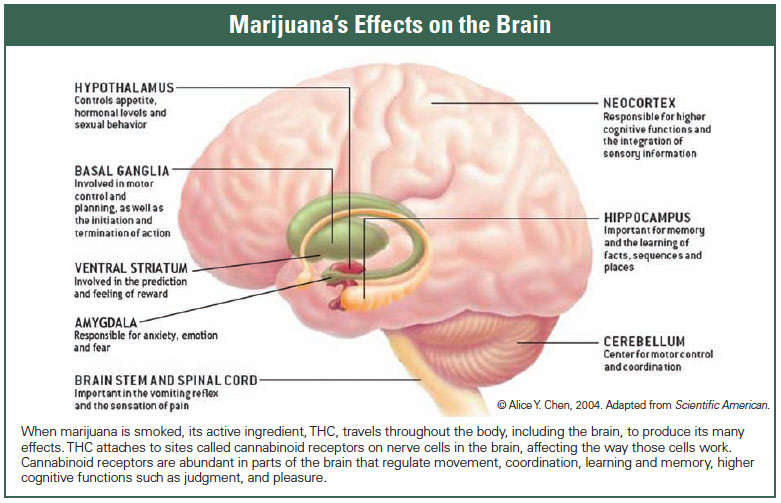Within minutes after smoking marijuana, the heart rate accelerates, the blood vessels dilate, the eyes redden, the blood pressure rises – the effects of marijuana cause significant changes in the body.
The changes that marijuana causes in those who consume it are not only physical, but also mental, the effects of marijuana on the brain are well known, we think that today few people do not know what marijuana is, however, it is necessary to stop and remember what exactly this substance is.
- Marijuana or cannabis is a green or gray mixture of dried flowers and broken leaves of the hemp plant.
- Which has more than two hundred popular terms.
Marijuana is the name that Mexicans gave to Indian hemp, it is a species of moraaceae and has the appearance of a fine nettle, measures about two meters and can be grown anywhere in heat, the properties of cannabis have made it a plant with multiple uses and of great tradition, used for recreational purposes (drugs) , medicinal and industrial (as raw material).
Cannabis is native to Central and South Asia. The Assyrian people used it in their religious ceremonies and called it “qunubu”. And so, in the past, the history of cannabis began in religious rituals around the world.
The main active chemical of marijuana is THC (delta-9-tetrahydrocannabinol). THC is the main psychoactive compound in cannabis and one of more than 80 different cannabinoids in this plant. In addition, TCH is the most abundant cannabinoid in the cannabis plant.
When marijuana is consumed, whether smoked, vaporized or ingested, cannabinoids interact with various receptors in the brain and body (which are part of the endocannabinoid system), in this way consumption generates different symptoms or signs in consumers.
THC is the main psychoactive compound of cannabis and one of the more than 80 different cannabinoids of this plant.
The membranes of some nerve cells contain protein receptors that retain THC. By interacting with these receptors, THC produces a wide variety of effects on the body, such as feelings of euphoria, relaxation, joy and more. On the other hand, there are cannabis, plants that are used to produce industrial hemp. They contain less than 1% THC and are not suitable for recreational use.
Cannabis has been used since ancient times for its physical and psychological effects, the effects of marijuana on the brain imply a widespread change in perception, euphoria and better mood.
In addition, its consumption increases appetite and produces the feeling of being “high”. Immediate side effects include short-term memory loss, dry mouth, red eyes, decreased motor skills and anxiety.
In the long term, marijuana can decrease mental capacity and lead to addiction, the immediate effects of marijuana last between two and eight hours and begin a few minutes after consumed, when smoked, if swallowed, the effects take between 30 minutes and an hour. to show up.
The effects of marijuana on the brain produce a change in perception
It has been repeatedly said that marijuana is a harmless drug, however, the negative effects of marijuana can be numerous and not insignificant, one of these effects, often less important, is muative syndrome, the muativeational word can contain everything that makes the marijuana addict considered a true “social patient”.
The effects of muative syndrome, according to psychiatrist Vallejo-Nejera, go through the following four phases:
Subjective effects begin immediately after initiation of inhalation; its maximum effects (also at the subjective level of the smoker) are reached thirty minutes after smoking; the duration of these effects can be estimated at four hours for inhalation and eight hours for oral ingestion. what the consumer most often emphasizes is the change in the meaning of time: it seems longer than it really is.
One of the effects of marijuana, which often doesn’t matter much, is muative syndrome.
They also cite increased hearing sensitivity and greater appreciation of music. Some people evoke a subjective impression of increased sense of touch, taste and smell. In general, the effects of marijuana on the brain depend on the way ingestion and the amount of active ingredient Tetrahydrocannabinol does not dissolve in water, so only ingestion and inhalation can be the ways to consume the drug.
When acute intoxication occurs, paranoid ideas, delusions, hallucinations, depersonalization, delusions, confusion, agitation and excitement can occur, there may also be delirium and darkness with agitation and violent excitement, these effects disappear in a few hours.
The effects of marijuana on the brain in cases of acute poisoning can be hallucinations, paranoid and delusional ideas.
Consumer personality also influences. Another type of psychotoxic reaction is observed in people who appear to be dominated by great anxiety, fear and panic; these people are often agitated and depressed, and sometimes retracted.
The reality is that we should not joke about drug use, even though we are talking about a drug with the tradition of marijuana, its use has increased mental pathology among young people, a fact that is all the more worrying when you consider that it increases the likelihood that the consumer will have a psychotic rupture. In addition, the rise of certain problems, such as anxiety and panic attacks, is linked to its usual consumption.
references

